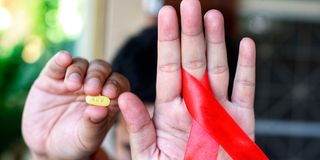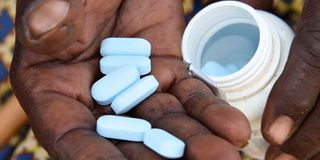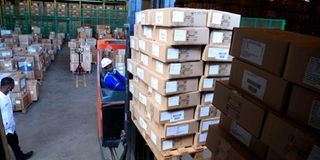Premium
Kenya exports lifesaving HIV drugs amid local shortage

Antiretroviral (ARV) drug.
Just two months ago, people living with HIV in Kenya were in distress over a crippling shortage of first-line antiretroviral (ARV) drugs. Many were forced to ration their medication, altering dosages in a desperate attempt to make limited supplies last longer.
Meanwhile, an emergency consignment of ARVs worth $34 million (Sh4.4 billion) sat untouched in a Nairobi warehouse, awaiting distribution since the previous year.
These essential drugs, used to treat co-infections of HIV and tuberculosis, and prevent perinatal transmission, were scheduled for nationwide distribution in January. But a delay in funding stalled their release, even as infections threatened to rise.
“What is the point of having these drugs in-country if those who need them can’t access them?” asked Nelson Otwoma, director of the National Empowerment Network of People Living with HIV/AIDS in Kenya. “Why are we waiting for money while lives hang in the balance?”
At the time, the government attributed the delay to the lingering effects of a 90-day foreign aid freeze imposed by United States President Donald Trump. While Sh3.88 billion worth of drugs sat in storage, the government needed just Sh1.2 billion to distribute them to health facilities.

A patient displays one type of the ARVs in use in Kenya.
As the crisis unfolded, the Ministry of Health, National Syndemic Diseases Control Council and the Council of Governors floated the idea of supporting local manufacturing of essential health commodities. Yet no tangible action was taken to engage Universal Corporation Limited (UCL), a Kenyan pharmaceutical company already producing ARVs locally.
Ironically, the same company has now made global headlines after exporting 72,000 doses of the HIV drug to Mozambique. In a celebratory announcement, the Global Fund to Fight AIDS, Tuberculosis and Malaria declared it had “reached a historic milestone by procuring, for the first time, a first-line HIV treatment manufactured in Africa”.
Mozambique’s Health Minister Ussene Hilário Isse welcomed the shipment as a breakthrough for the continent.
“Africa’s growing capacity to locally produce lifesaving medications marks a strategic shift, reducing dependence on imports and enhancing our ability to respond swiftly to public health challenges,” he said.
However, this global success story stirred discomfort at home. Many Kenyans are now questioning why their government failed to capitalise on this manufacturing potential to resolve local shortages.
“The sad reality is that Kenya is exporting hope while denying it at home,” said a health sector insider familiar with the issue. “Local manufacturers are ready and capable, but without government support, they will naturally shift towards more reliable international buyers.”
As Kenya celebrates its role in shaping Africa’s pharmaceutical future, the pressing question remains: when will the benefits be enjoyed by its own people?

Kemsa staff packing HIV drugs before being dispatched to various counties at Kemsa warehouse in Embakasi, Nairobi, on April 22, 2021.
UCL Managing Director Perviz Dhanani told the Nation: “We have one million patients on HIV treatment, and although we have a WHO-prequalified product available and locally manufactured, it is unfortunate that not a single one of these patients in need is being treated with our medication. Everything is imported from outside the continent.”
“The government has never procured from us, and we do not have agreements with the government regarding the supply of HIV drugs for domestic use,” he added, stating that the firm has “sufficient capacity to supply the Kenyan market as well as several export markets”.
While dismissing the March shortage as untrue, Nascop Chief Executive Officer Andrew Mulwa said that UCL has been supplying Kenya with dolutegravir since 2022, However, UCL management denied this, saying that Kenya only procured the drugs from them once, in 2022. The recent export, explained Dr Mulwa, happened through the Global Fund mechanism.
“The government is okay with the exports. There is nothing wrong, because they can manufacture for the country and the region,” he added.


